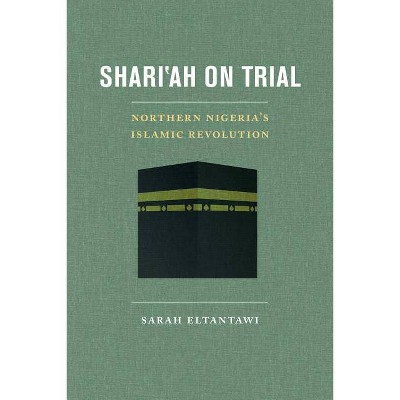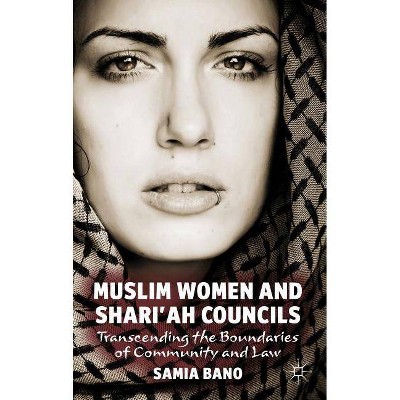Shari'ah on Trial - by Sarah Eltantawi (Paperback)

Similar Products
Products of same category from the store
AllProduct info
<p/><br></br><p><b> Book Synopsis </b></p></br></br>In November of 1999, Nigerians took to the streets demanding the re-implementation of shari'ah law in their country. Two years later, many Nigerians supported the death sentence by stoning of a peasant woman for alleged sexual misconduct. Public outcry in the West was met with assurances to the Western public: stoning is not a part of Islam; stoning happens "only in Africa"; reports of stoning are exaggerated by Western sensationalism. However, none of these statements are true. <i>Shari'ah on Trial</i> goes beyond journalistic headlines and liberal pieties to give a powerful account of how Northern Nigerians reached a point of such desperation that they demanded the return of the strictest possible shari'ah law. Sarah Eltantawi analyzes changing conceptions of Islamic theology and practice as well as Muslim and British interactions dating back to the colonial period to explain the resurgence of shari'ah, with implications for Muslim-majority countries around the world.<p/><br></br><p><b> From the Back Cover </b></p></br></br>"In this important and timely contribution, Eltantawi carefully attends to the historical context of the Amina Lawal case and impressively presents a set of original contributions to our understanding of contemporary African and Muslim societies and the significance of discursive and practical changes in approaches to Islamic law in this part of the world. This book is a well written, compelling, and insightful monograph with much promise."--Omid Safi, Professor of Islamic Studies, Duke University, and author of <i>The Politics of Knowledge in Premodern Islam</i> and <i>Memories of Muhammad: Why the Prophet Matters</i> <p/> "<i>Shari'ah on Trial</i> is a notable, memorable, and promising addition to literature in the field of contemporary Islamic studies. It serves to fill a significant geographical gap and excels at linking the historical, legal, and political dimensions of shari'ah law in Nigeria. Eltantawi demonstrates her skills by simultaneously weaving a coherent narrative and putting it in conversation with secondary literature and relevant theories. Even better, she tells a story, thus engaging the reader and opening up possibilities for discussion, which only the best of books will do."--Juliane Hammer, Associate Professor and Kenan Rifai Scholar of Islamic Studies, University of North Carolina, Chapel Hill, and author of <i>American Muslim Women, Religious Authority, and Activism</i> and <i>Palestinians Born in Exile</i> <p/> "I am impressed with how well the author has nuanced the interpretation of shari'ah in the Nigerian and global contexts in ways that take into consideration the historical, social, and cultural contexts of the institution and its practice. This interpretation displays Eltantawi's uncommon skill as a deep thinker and her ability to produce a work that is rigorous and original. The work is provocative, creative, and compelling, confronting old orthodoxies with fresh and convincing insights. Eltantawi's work displays a keen knowledge of the materials and a propensity for building new paradigms in her scholarly field. The book is also significant on several accounts. Firstly, it fills a gap in our knowledge of the centrality of the shari'ah in northern Nigeria's sociopolitical order. Secondly, it examines the intersection of law, history, and religion in modern Nigeria, and thirdly, its comparative focus enables us to understand the global importance of what may at first look like a local and national phenomenon."--Jacob Olupona, Professor of African Religious Traditions, Harvard Divinity School, and Professor of African and African American Studies, Harvard University<p/><br></br><p><b> Review Quotes </b></p></br></br><br>"Eltantawi's scholarship is evident through her meticulous use of sources and historical detail. However, there is another strength in her work that deserves attention--her vignettes of Nigerian life. Not only do these interludes provide necessary context, they are evidence of Eltantawi's intimate knowledge of Nigeria, her careful analysis, and her respect for the subject."-- "Reading Religion"<br><br>"Sarah Eltantawi offers a dazzlingly nuanced and lucid account of the past and present of the stoning punishment in Northern Nigeria. Effortlessly moving between pre-modern and contemporary archives and contexts, Eltantawi traces the shifting meanings and political projects that have been invested into the stoning punishment over time. Historically grounded, theoretically exciting, and lucidly composed, this book is sure to spark important conversations and debates in multiple fields."-- "New Books in Religion Network"<br><br>"<i>Shari'ah on Trial: Northern Nigeria's Islamic Revolution</i> is an excellent study of Northern Nigeria Sharia politics. It provides a rich analysis not just of the Amina Lawal case but also of the Islamic discursive tradition in Muslim West Africa."--Ousmane Kane, Harvard Divinity Law School, "American Journal of Islamic Social Sciences"<br><p/><br></br><p><b> About the Author </b></p></br></br><b>Sarah Eltantawi </b>is Assistant Professor of Comparative Religion at Evergreen State College and an analyst of the Muslim-majority world on major media outlets.
Price History
Price Archive shows prices from various stores, lets you see history and find the cheapest. There is no actual sale on the website. For all support, inquiry and suggestion messagescommunication@pricearchive.us




















